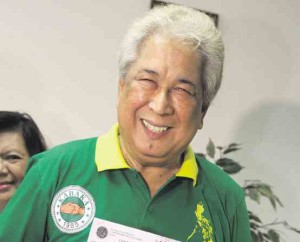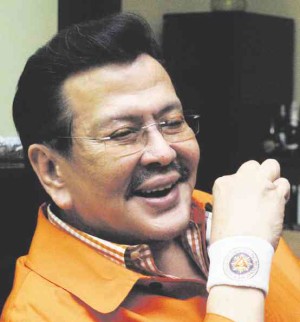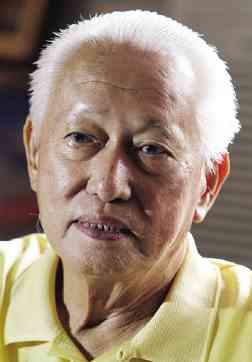Elections 2016: Manila bets’ agenda, beyond the word war
In a series leading to the May 9 elections, Inquirer Metro has asked mayoral candidates in Metro Manila about their plans to address three of the most pressing concerns that affect residents and nonresidents alike in their respective local government units.
On the traffic situation, they were asked to identify the main problem areas and how they intend to ease road congestion on these routes.
For peace and order, what would be their innovative ways to fight the drug menace and curb street crimes like robberies and killings perpetrated by motorcycle-riding assailants?
Regarding informal settlers, how are they solving their plight and where in the locality do they plan to focus?
On paper, a total of 11 candidates want to lead Manila, a city of 1.6 million with a voting population of 974,479. On the ground and on the minds of voters, however, there are only three contenders waging serious campaigns—political veterans who have engaged each other in verbal skirmishes onstage and on the stump. Beyond the word war, here are their plans.
***
Article continues after this advertisementAmado Bagatsing, 68; incumbent congressman
Article continues after this advertisement
We need to make full use of primary and secondary roads, and create a parking schedule. For example, strictly no parking from 5:30 a.m. to 8:30 a.m; and from 4:30 p.m. to 8 p.m.
Designate more one-way streets; activate barangay traffic brigade in secondary and tertiary roads so they can be used for alternate routes.
My medium-term plan is to engage private businesses to put up parking buildings, since these establishments will be affected if the no-parking policy is enforced.
On peace and order: Policemen should be highly visible. We can reintroduce the beat patrol, buddy system in every barangay. Barangay chairs know who the criminals are. We can create a system to protect informants who will help us catch these people.
I want to create a special group of policemen, a strike force who will focus on the drug problem.
On informal settlers: Tondo and Sta. Cruz (will be my focus). We will create an inventory of idle lands and identify sites for medium- to high-rise apartments.
Create an affordable housing program. In the first five years, the local government, in partnership with the National Housing Authority and Housing and Urban Development Coordinating Council, can take care of building maintenance, then a gradual phaseout of 15 years, after which the housing association (residents) can take over the building.
To give the poor better job opportunities, we will talk to businessmen to see what skills they need so we can match this in training centers.
JOSEPH ESTRADA, 79; incumbent mayor, former President

On peace and order: There is order and discipline when policemen or traffic enforcers are highly visible. There should therefore be a sufficient number of such personnel. Traffic enforcers must be rightly compensated so they will do their jobs with honesty and honor.
The police must have high morale, that’s why I allocated
P20 million to renovate the MPD headquarters, gave them individual allowances of P2,500 monthly, poured in at least P136 million for other financial needs of the local police, plus some P150 million worth of equipment.
For drug abuse prevention, I created the DARE (Drug Abuse Resistance Education) program wherein police officials conduct regular seminars (twice a week) for Grade 6 students. In line with this, the ‘Edukasyonkariton’ (literacy program) is in the works to target out-of-school youths.
I empowered the barangays to cooperate closely with City Hall and the police in reporting suspected drug pushers.
On informal settlers: City Hall has filed eight expropriation cases and allocated compensation funds for owners of lots that had been marked for planned housing sites.
I created a housing project in Sitio Dubai, Baseco Compound, which was offered for free to the city’s “poorest of the poor.” The P44.5-million project covers a
3.5-hectare area where a total of 128 units will be completed in June.
Our “Land for the Landless” program recently awarded land certificates to 65 families, the latest batch of beneficiaries of the socialized housing program which started in 2013. Of the 65 families, 53 were given lots at Villafojas Estate on Villafojas Street, Tondo. The first batch of 78 families were given their own lot certificates in September that year, followed by 57 more in April 2014, and another 40 in February 2015.
ALFREDO LIM, 86; former mayor, former city police chief

I plan to post traffic policemen and traffic aides at major intersections so that people will know that they are there to direct traffic. What is usually happening now is that these traffic enforcers stay at street corners while idly chatting with each other.
Drivers or private citizens should file formal complaints if they see traffic officers engaging in extortion and bribery, so we can have these erring officials investigated and suspended.
On peace and order: Like what I did before, I will ban all drug pushers from the city. I told them: “Get out of Manila; I don’t care where they plan to transfer.”
Barangay officials know the identity of these pushers. I asked barangay chairs to give us names, otherwise we would also charge them for tolerating the activities of these people. During my time, since the barangay chairs cooperated, we had zero drug pushers in the city.
If some individuals still refuse to obey, I will paint these words on their houses, like what I did before: ‘Beware: In this house lives so and so, a drug pusher.’ This had a strong effect; it helped us weed out drug peddlers because we put them to shame. We would paint that sign in the morning; come nighttime, they would be out of the city.
The MPD should do they duty and actively pursue criminals. Many of the people they arrest have been in and out of jail several times, so the police know them already. I have to order the MPD chief and precinct commanders: If your (subordinates) can’t follow you, I’ll have to request that you be relieved. If they cannot control their own officers’ actions, then what are they there for?
On informal settlers: To focus on Parola 1, Parola 2, Happy Land.
I plan to build high-rise, 20- to 30-level condominium buildings. Rent-to-own at very low rates, payable in 20 to 25 years. We are going to issue titles to prove their ownership, so they can have the property mortgaged or pass it on to their children. Then we will get rid of the shanties and rehabilitate the areas they will vacate.
I will have the condominiums built on vacant lots. There are still many of these in the city.